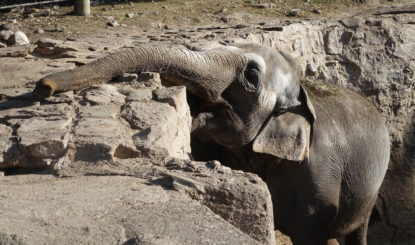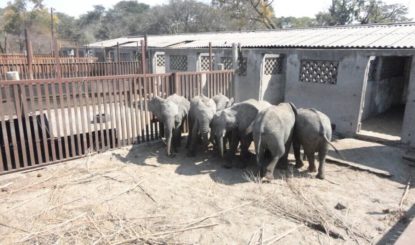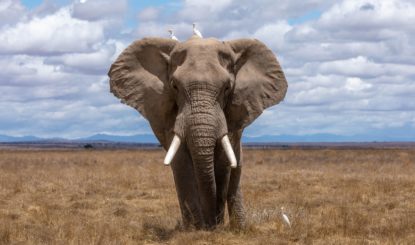Media Release: CITES gives green light to export of Namibian elephants
On 8 September, the Secretariat of the Convention on International Trade in Endangered Species of Wild Fauna and Flora (CITES) issued a statement giving the green light to the capture and export of dozens of elephants from Namibia. About 40 elephants (adults and calves) will be taken from their family groups and transported out of Africa, where they will end their lives in captivity in zoos or safari parks. Fondation Franz Weber (FFW) is outraged that the CITES Secretariat, as it often does, has taken a position that goes far beyond its mandate of protecting endangered species.
In principle, CITES rules prohibit Namibia from exporting live elephants outside their natural habitat.[i] However, and not for the first time, Namibia has shown no regard for the existing regulations.[ii] The nation has totally misinterpreted a rule in order to justify sending elephants out of Africa. It intends to capture and sell 57 wild elephants, around 40 of which will be exported.
This unilateral interpretation of CITES regulations by Namibia is being questioned by other countries and by many conservation NGOs. In fact, the CITES Standing Committee (its executive body) has already been tasked with examining its legality at its next meeting in early 2022.[iii]
It will therefore be the CITES Parties (member States) that will have to decide on whether Namibia’s interpretation of the Convention – and its current and planned exports – is legal. This, however, is NOT the role of the CITES Secretariat, whose sole function is to ensure the operational functioning of the Convention, and not to substitute the Parties’ judgement on how the Convention is applied.
“By confirming Namibia’s interpretation, the Secretariat has not only exceeded its authority, but also goes against the development of the regulations and the spirit of the latest decisions taken by the Parties to CITES,” explains Anna Zangger, Director of International Campaigns of Fondation Franz Weber (FFW). “This is simply unacceptable.”
At the most recent CITES Conference of the Parties (CoP18) in August 2019, the Parties had decided to restrict exports of African elephants, in order to prevent them from being sent to zoos outside Africa. The IUCN African Elephant Specialist Group – which brings together biologists and experts on elephants from around the world – believes that such “ex situ” exports do not contribute to the protection of the species. [iv]
According to FFW’s information from the field,[v] the captures have already begun, mainly in two regions in the northwest where a particularly vulnerable population of desert-adapted elephants exist. These captures and exports could well mean the disappearance of this unique elephant population.
“Again and again, the CITES Secretariat supports such exports – forgetting the primary purpose of the Convention, which is the protection of species,” says Vera Weber, President of FFW. “The Secretariat should be the voice of all member countries, not just those who are desperate to sell their elephants for short-term profit.”
______________________
[i] The Namibian elephant population is listed in Appendix II of CITES, with an annotation that limits exports of live elephants to “in situ conservation programmes”. However, this limitation does not exist for elephant populations listed in Appendix I, when exports are to zoos. The last paragraph of the annotation for Namibian elephants provides, in relation to the ivory trade, that “all other specimens shall be deemed to be specimens of species included in Appendix I and their trade shall be regulated accordingly. This provision, originally adopted to further protect elephants from the ivory trade, is being used by Namibia to avoid applying the more restrictive Appendix II rules and thus be able to freely sell its elephants outside Africa.
[ii] In 2012 and 2013, Namibia sold 18 and 6 elephants to Mexico and Cuba respectively, using an abusive interpretation of CITES.
[iii] https://cites.org/sites/default/files/eng/com/ac/31/sum/E-AC31-ExSum-03.pdf
[iv] AfESG. 2003. Statement on the capture of wild elephants for use in captivity. IUCN-SSC African Elephant Specialist Group, Mokuti Lodge, Namibia, 2003. https://www.iucn.org/ssc-groups/mammals/african-elephant- specialist-group/afesg-statements/removal-african-elephants-captive-use
[v] Dr Adam Cruise’s investigative report on sales of wild live elephants (Loxodonta africana) from Namibia, Sept 2021. https://africanelephantjournal.com/investigation-of-live-elephants/




